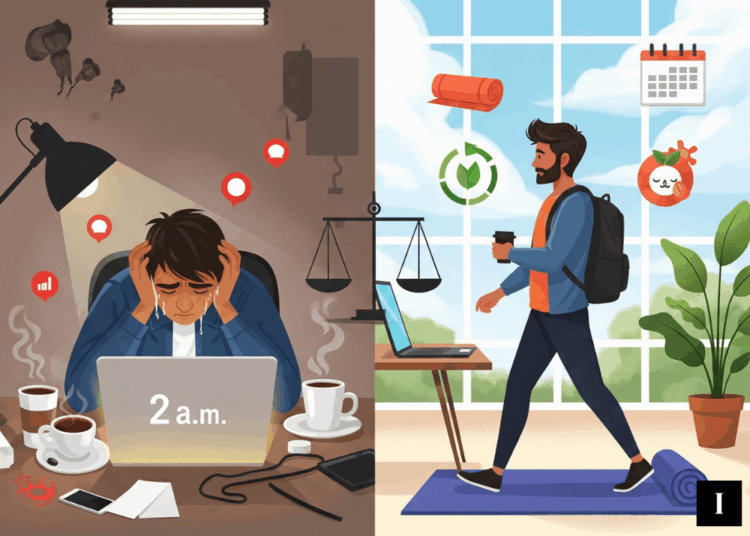The Double-Edged Sword of Startup Culture
The term startup culture often conjures images of fast-paced innovation, flexible workspaces, and mission-driven teams. It’s a dynamic environment where ideas flourish, growth is rapid, and possibilities seem endless. But behind the allure of hackathons, ping pong tables, and late-night coding sessions lies a growing concern—startup burnout.
For many founders and entrepreneurs, the very culture that fuels their ambition also pushes them toward physical and emotional exhaustion. With high stakes, limited resources, and relentless pressure to scale, the risk of burnout in startups is more than just a workplace issue—it’s a mental health crisis in the making.
Startup Culture: The Hidden Stress Engine
While startup culture prides itself on agility and disruption, it can also normalize unsustainable habits: overworking, skipping breaks, and wearing exhaustion like a badge of honor. Startups often equate hustle with success, inadvertently creating a pressure cooker environment that fosters startup stress.
In this ecosystem, founder burnout becomes a common narrative. Founders are not only responsible for steering the ship but are also deeply emotionally invested in their vision. This blend of emotional labor and constant decision-making wears down even the most resilient individuals.
According to recent studies, nearly 72% of entrepreneurs report experiencing mental health issues. Anxiety, depression, and burnout are widespread—especially among solo founders or those in early-stage ventures. The glorification of the grind culture only worsens these conditions.
Founder Burnout: The Cost of Hustle Without Boundaries
Founder burnout is not just about feeling tired. It manifests as emotional depletion, reduced performance, and a loss of personal identity. Founders often suppress their struggles to maintain investor confidence, team morale, and customer trust. But silence is dangerous.
The signs of entrepreneur mental health challenges include chronic fatigue, irritability, insomnia, and detachment from work. Ignoring these signals can lead to long-term consequences, not only for the founder but for the entire startup.
When burnout strikes, productivity drops, innovation halts, and turnover increases. Mental health directly correlates with business health—making it essential to address the root causes ingrained in startup culture.
Rebuilding Startup Culture for Sustainable Success
To achieve sustainable startup success, the culture itself needs transformation. This doesn’t mean sacrificing ambition; it means redefining how success is measured and how well-being is prioritized. Founders must lead the charge by modeling balance and empathy.
1. Normalize Conversations Around Mental Health
Open dialogue around startup mental health helps dismantle stigma. Founders who share their vulnerabilities set a powerful example. Implementing mental health days, access to counseling, and peer-support groups can build a healthier culture.
2. Redefine Productivity
Startups thrive on output, but quality should always trump quantity. A culture that values rest, reflection, and intentional work over constant hustle reduces startup stress and increases innovation.
3. Delegate and Empower
Micromanagement is a quick road to burnout. Founders must learn to delegate effectively, empowering team members to take ownership. This not only preserves the founder’s energy but also cultivates a sense of responsibility across the organization.
4. Set Boundaries and Enforce Them
Work-life balance in startups often feels like a myth, but boundaries are key to preventing burnout in startups. Encourage fixed working hours, discourage after-hours emails, and respect personal time.
5. Regularly Evaluate Culture and Workloads
Culture should evolve. Regular team check-ins, workload audits, and feedback loops allow founders to assess the health of their teams and themselves. Building a culture that adapts based on people’s needs is the essence of sustainable startup success.
Startup Culture Can Be a Force for Good—If Shaped Intentionally
While startup culture has historically leaned into high-intensity models, there’s a growing shift toward conscious company building. The new wave of entrepreneurs understands that growth at the cost of well-being is not true success.
Founders who focus on entrepreneur mental health and foster psychologically safe workplaces are not just avoiding burnout—they’re building businesses that last. Mental wellness becomes a competitive advantage, and culture becomes the strongest pillar of brand identity.
With the right strategies and mindset, startup burnout doesn’t have to be inevitable. It can be prevented, managed, and even transformed into an opportunity for cultural renewal and long-term impact.
Conclusion: Founders, Take Care of Yourselves First
At the heart of every startup is a founder with a vision. But to nurture that vision, founders must first protect their own well-being. A thriving startup begins with a healthy mind, a balanced life, and a workplace culture that values both.
It’s time to rethink what startup culture truly stands for. Not just innovation and disruption—but also compassion, sustainability, and human-centered leadership. That’s the real formula for success.
Explore more insights on sustainable business leadership and mental health in IMPAAKT—your trusted top business magazine for changemakers and founders.











